How do you get to school? Do you walk, scoot or cycle? Perhaps you take a car, taxi or bus?
For some children around the world, the school run looks a little different.
From swimming across a dangerous river to a long walk through the jungle, discover some of the journeys children living in poverty take to reach the classroom.
Swimming, the Philippines
It’s dawn in the Philippines, and 13-year-old Mary packs her bag ready for school. Until recently, Mary had to take extra clothes along with her books, notepad and pencil case as her journey to school involved swimming across a dangerous river.
Mary is part of the Compassion Sponsorship Programme and seeing the need for a safer way to get to school, the local church provided children with a canoe. Now Mary and her friends can travel safely by boat, made from a coconut-tree trunk.
The journey across the river is only the start of their school run. Once all the children have crossed the river, they laugh and play for the rest of their 45-minute journey through the coconut groves and rice fields. Despite the long journey, Mary is excited to reach her school and attend activities next door at her Compassion project, held at the local church.
Watch the whole journey below.
We’re rejoicing that as part of the Compassion Sponsorship programme, children like Mary are given the uniforms and resources to attend school. Plus, extra educational support and lessons at their church-driven Compassion project!
Enjoy six more fascinating school runs from some of the countries where Compassion works.
By Boat, Ecuador
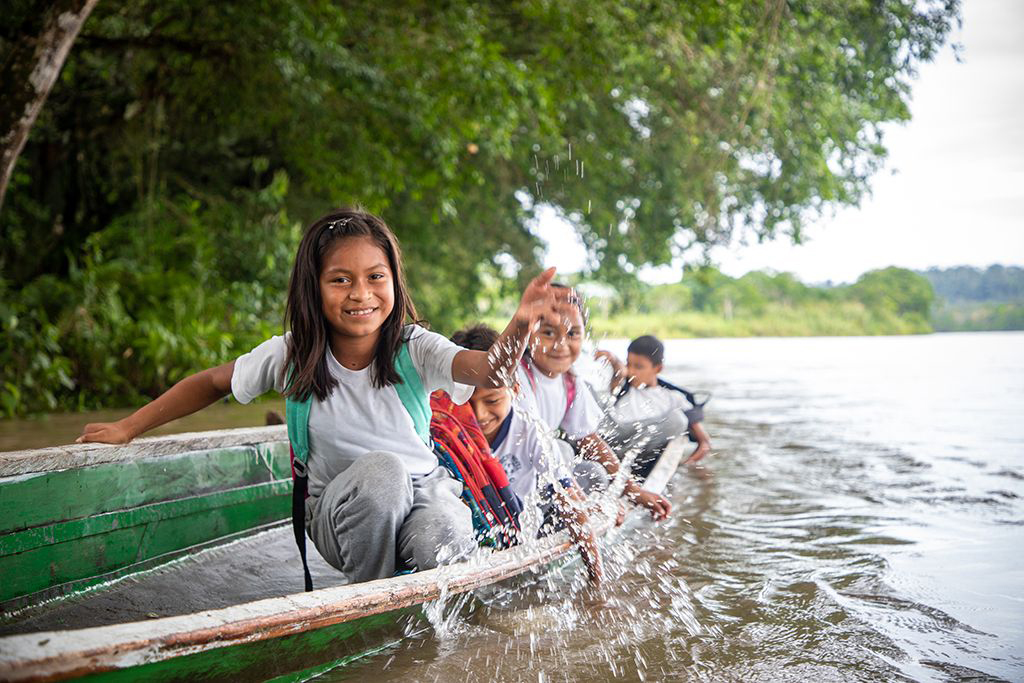
It’s 5am in the community of Pucachicta in the Ecuadorian Amazon. Katy, Wendy and Dani are waking up, before making their journey through the jungle to their school in a neighbouring community.
While Katy puts all her notebooks in her backpack, her mother prepares something to eat on the woodstove. Food is not abundant in their community, however, a drink made with boiled yucca called chicha provides enough energy for the start of a long day.
To go to school, Katy must walk 20 minutes to the river, but she doesn’t do this alone.
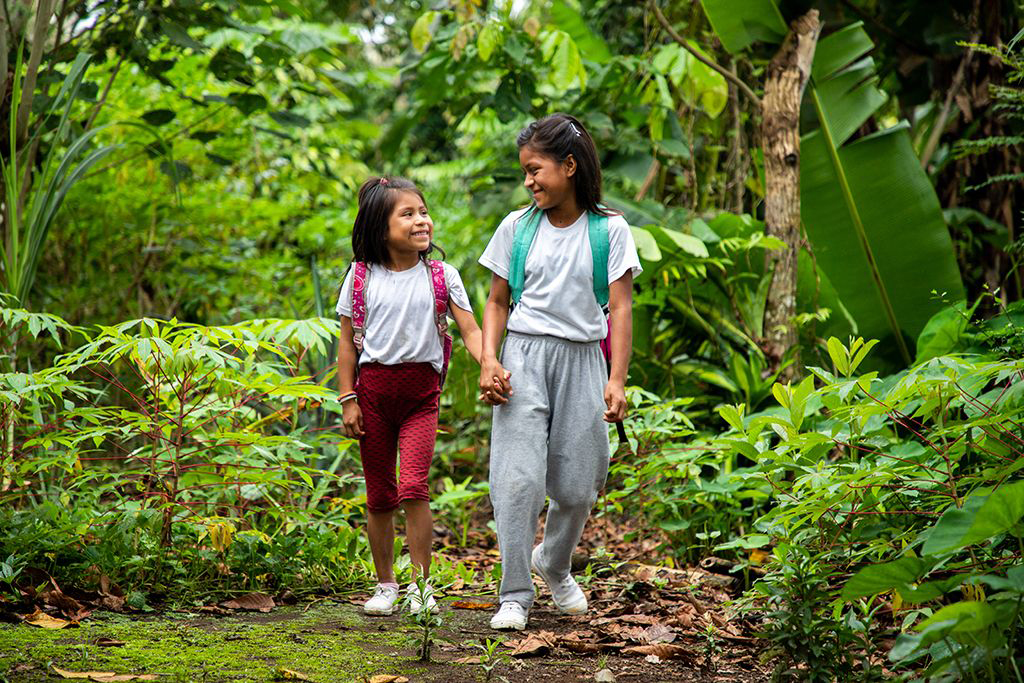
Katy walks with her sister Wendy. Together, holding hands, they walk through the jungle to the river.
“Here in the jungle the children are safe, we all know each other and we all help each other,” Katy’s mother explains. “That’s why I’m happy that my daughters walk to the river, but I always tell them not to stray from their path.”
Along the way, Katy and Wendy are joined by more children who also walk to the river, including seven-year-old Dani.
At the river the children meet two parents waiting for them with their canoes. The canoe trip is not long — 15 to 20 minutes. Once inside the canoe, the children are careful not to move too much to avoid flipping over the canoe.
Although the total trip can last between 45 minutes to an hour, the children do not complain about their long journey to school. On the contrary, they enjoy playing and having fun every day as they go to school.
“I like to learn at school, although sometimes we arrive a little late to the canoe because we stay playing in the road and when we realise we are late, we run very fast trying to not lose the canoe,” says Katy with a laugh.
40 minutes to the nearest motostop, Peru
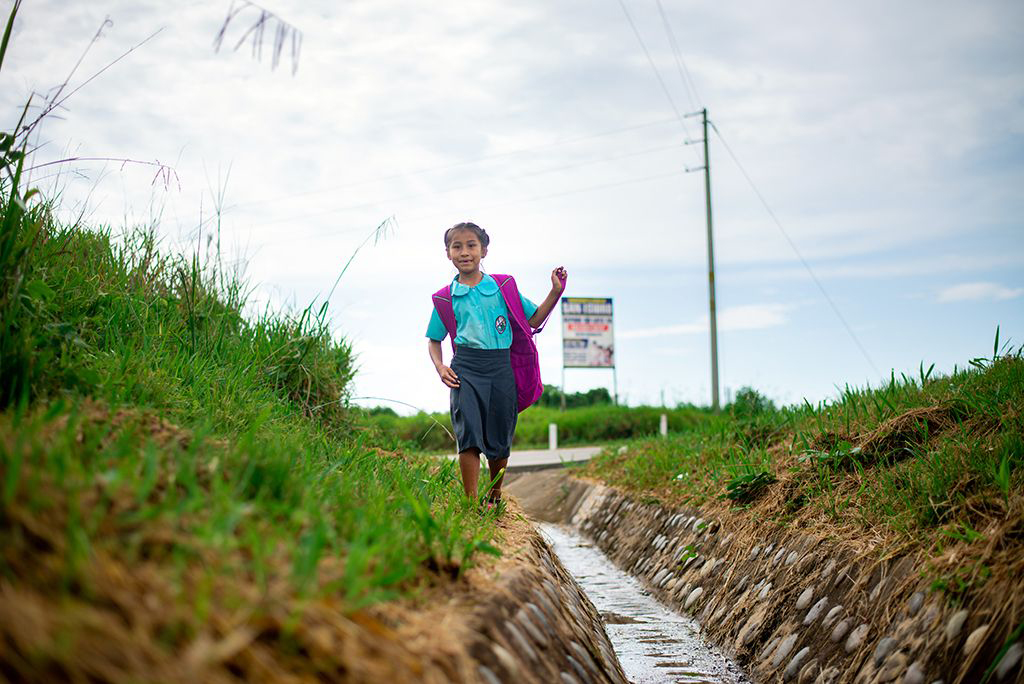
It’s 5:30am in Peru and there’s no lie in for 7-year-old Taywa. Since it takes her more than an hour to get to school, she needs to leave the house at 6am sharp.
“I wake up very early in the morning because I have to get my things ready to go to school. My mum always braids my hair and I love it. Then, we have to walk for about 40 minutes to get to the closest mototaxi stop. We go the rest of the way by mototaxi, but that’s only when my mum has enough money,” says Taywa.
With the minimum wage of USD 120 that she earns from working as a housekeeper in a local hostel, Leyla, Taywa’s mother, does her best to spend her money wisely and pay the rent, buy food, and cover the household expenses. This means there isn’t always money to pay for transport to take them to school.
Still, Taywa and her mother are not discouraged, for Leyla is determined to work hard to provide her daughter with a good education.
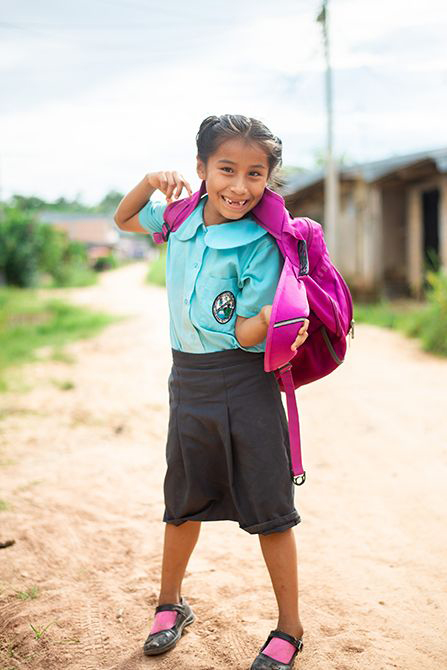
“I really like going to school. Sometimes, it takes me quite a long time to get there, but once I’m at school, I have lots of fun. Every time I go to school, I use the backpack I received from the [Compassion] project. I love my backpack because it is my favourite colour – fuchsia!” Taywa exclaims with happiness.
Thanks to the support of the Compassion programme, Taywa’s family is now receiving assistance through food baskets and school supplies, things that they couldn’t have obtained without the local church’s support.
“I am deeply grateful because I really know the people of the church care about my daughter. They want her to have the opportunity to study and have a better future, something uncommon in our community.” says Leyla.
Riding on a donkey, Colombia
It’s 6am in Varsovia village, Colombia, and Dianis and her brother are preparing to leave for school.
Dianis has been up since 5.30 am getting ready. “After bathing I put on my school uniform and eat breakfast – a delicious egg laid by one of our hens. My day at school starts at 7am, so my brother Dilan and I must be ready to leave for school at 6am.”
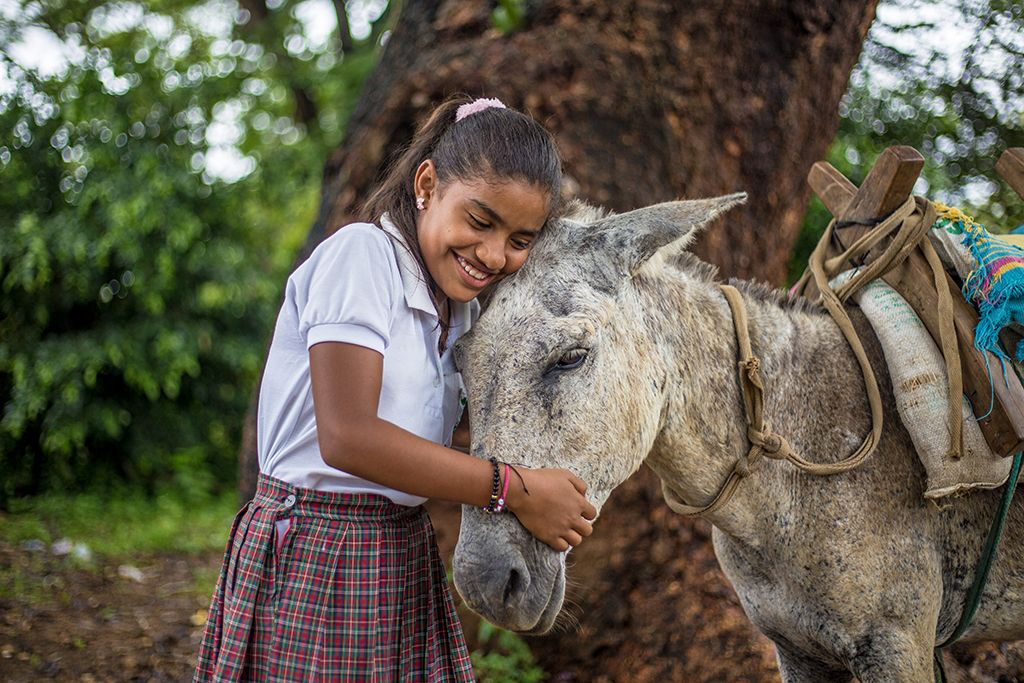
“My family lives in a rural area of Varsovia village. We came to live on a piece of land that belongs to my paternal grandfather because my parents did not have enough money to pay the rent for a house in the village. In the morning we hear the birds and everything is very quiet, but my school is an hour away from home, which has been difficult. My Compassion sponsor sends me letters encouraging me to study. Even though school is far away, I want to study because I want to get ahead and become a professional, a doctor or a crime investigator, I have not decided yet.”
Dianis and her bother Dilan, accompanied by one of their parents, ride their donkey, Mocho, to get to school each day.
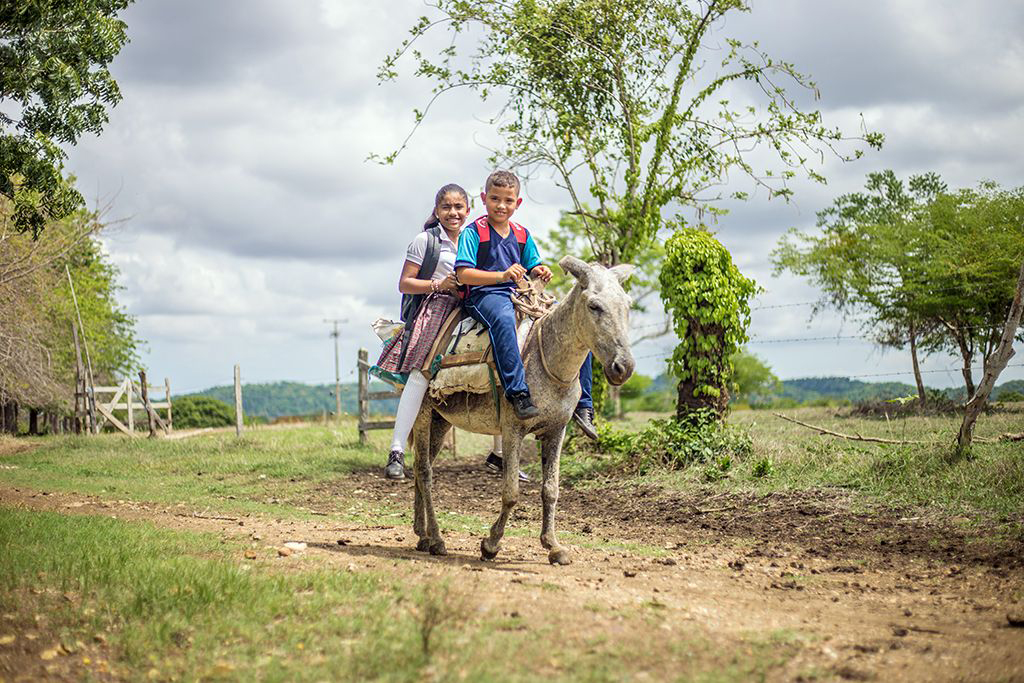
“The path to school is very nice, explains Diania. “Trees surround it, birds can be heard singing and we pass by several farms where there are cows and other animals. The weather in our village is warm, however sometimes it rains heavily and makes the path muddy and the trip to school becomes difficult. During rainy days, we arrive to school wet and muddy, but we know that what matters is to get there.”
While Dianis and Dilan are at school, Mocho waits for them in the shade of the trees where he’s given water and food.
“Mocho waits outside the school until noon, when the school day ends, to take us back home. At that time, the sun feels more intense and we are tired after school. Nevertheless, our parents have taught us that by studying we are going to have a better future and that makes our journey to school worthwhile,” says Diania.
Public transport, Brazil
It’s 6:40am in Brazil and Estefany is leaving her house in Paraíba.
“I need to walk tens of meters to get to the place where the public transportation comes to get me, says Estefany. “After a few minutes, Mister Zezinho, the driver, sounds a buzzer to alert me that he has arrived. I get in the car and meet the same faces that I see every day. The car, although still working well, is very old.
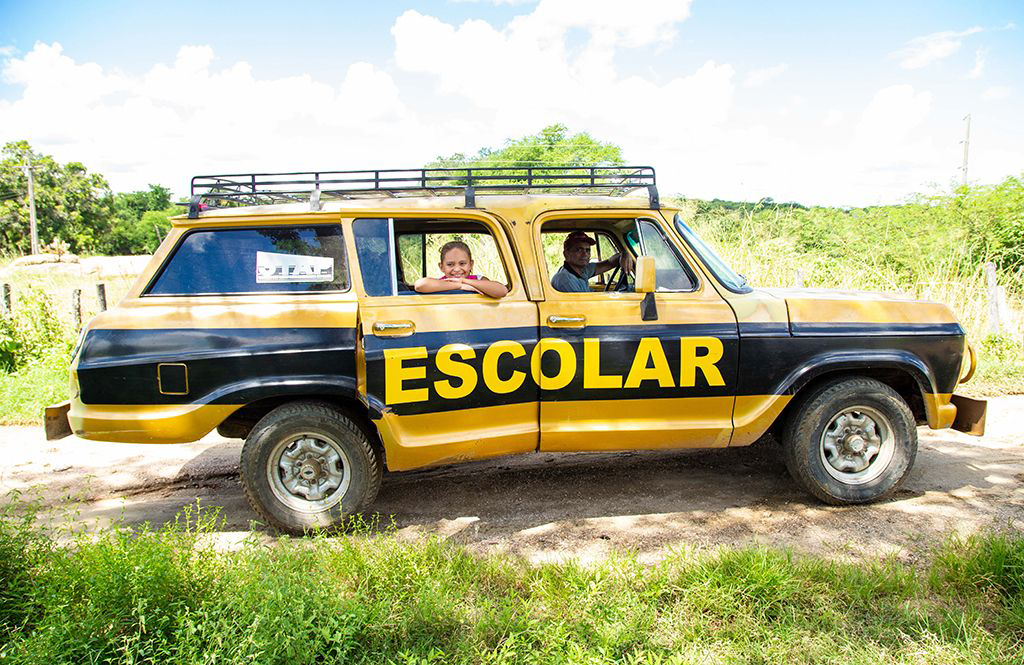
The climate here is always extremely hot, except during the rainy season, when the heat decreases but doesn’t end. Sometimes it gets very hot inside the car, especially when there are many students.
The part that I like most about my journey to school is to be able to watch the landscapes, especially when we cross the bridge over one of the rivers of our city. It’s very beautiful. When it rains, everything turns green. It takes us about 35 minutes to get to school. Classes begin at 7:15am. Often, there are transportation delays and we arrive late to school. On rainy days, the road is filled with mud and sometimes the car gets stuck in the mud. When that happens, we miss the first class at school. This is bad, but there is nothing we can do. It would be worse if we didn’t have any transportation.
Ultimately, I don’t mind waking up early or the hot weather. We get used to it. I know that studying is what will help me to have a better life. When I grow up I want to be a lawyer and I know I need to study hard to make it happen. I hope all this is possible one day.”
7,000 steps down a mountain
It’s 7.30 am in Mount Koghon, the Philippines. Lucia and her two grandchildren have already been walking for forty minutes. They’ve got at least another twenty to go before they reach the school gates. The heat is beginning to pierce through, the stifling humidity rising.
The journey is treacherous – the family’s way is marked with steep rocks and they have to concentrate hard. As the terrain steepens, Lucia picks up her grandson, 4-year-old John, and carries him under her arm. But despite her weariness and the pain in her back, Lucia is rejoicing.
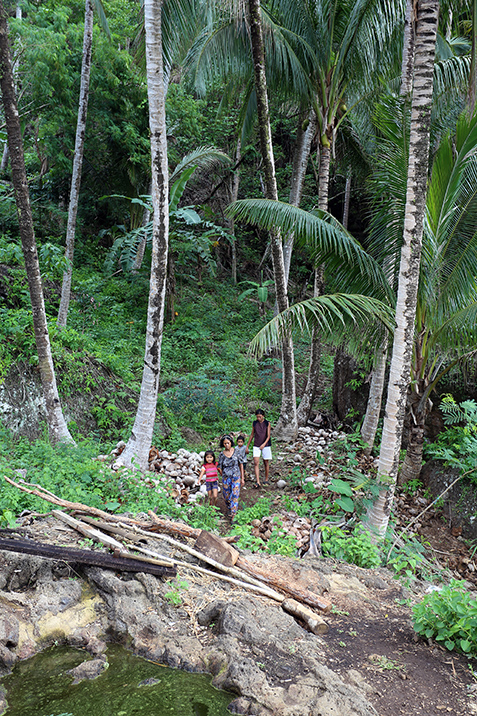
“When my two grandchildren were sponsored, I knew it was their ticket to a good future,” she explains. “Taking them to the student centre is not a difficult thing for me. I don’t mind.”
Lucia has lived on top of Mount Joghon all her life. A couple of years ago, when her daughter Jackilyn was abandoned by her husband, she opened her home to her grandchildren, John and 6-year-old Johannah.
The family live in a lone hut, an hour away from the nearest neighbours. It may be stunningly beautiful, but survival here is challenging. The hour’s journey down the mountain is not only the route to school and the Compassion project, it’s the only way to get rice.
An hour-long hike, Bolivia
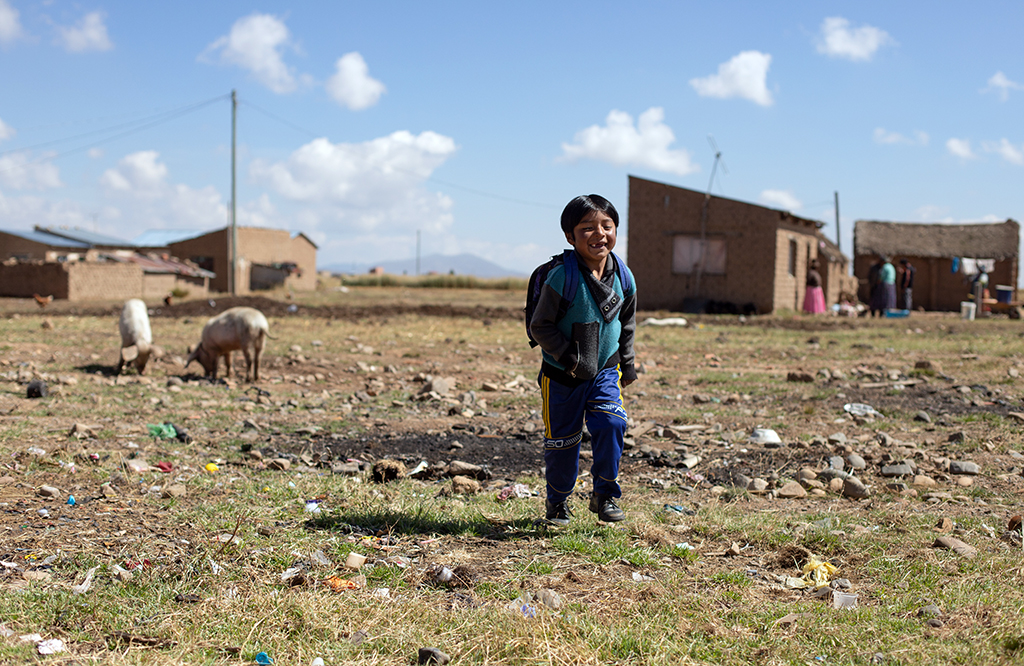
It’s 7am in Tumuyo, located in the rural altiplano (high plains) of Bolivia. Six-year-old Deymar is digging into a healthy breakfast of oatmeal and milk before beginning his hour-long walk to school.
Tumuyo is three hours away from La Paz city, an hour and a half of which has to be walked because there isn’t any transportation that goes to their community. One of four children, Deymar and his family share a small two-room house that has electricity and a tap for water, but no bathroom.
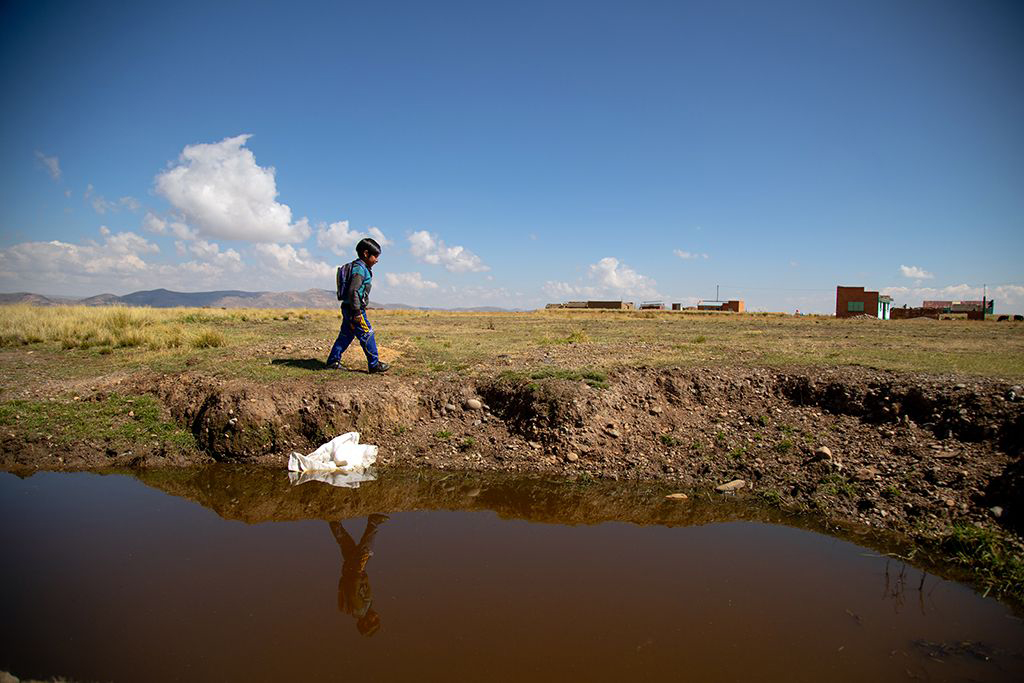
In this rural community, not everyone has the opportunity to study. Deymar’s mother, Rosana, studied until 5th grade and his father until 6th. But, Deymar, who is in 1st grade, is enthusiastic about studying and plans to finish school.
“I am learning to write. I sometimes get tired of walking but I like to go to school. Sometimes I play by kicking stones while I walk. I want to learn,” says Deymar.
These children’s journeys to school aren’t just impressive because of the effort they involve and the unusual transport method. They’re amazing because there are current;y 258 million children who won’t go to school this morning. They won’t go to school on any morning.
Here at Compassion, we believe every child has the right to education, but poverty means some children ae missing out. Compassion child sponsorship helps children receive the support they need to go to school by providing the uniforms and resources they need.




